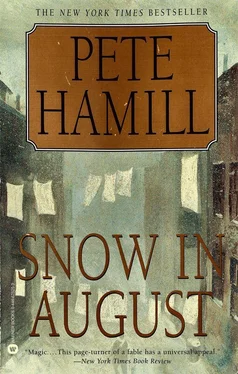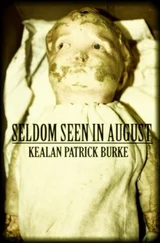Michael could see him in the study, consulting the magic alphabets, his face deep in concentration, murmuring words in a private language. And then on the evening of the so-called banquet, as Emperor Rudolf prepared to leave his castle in disguise, so that nobody in Prague would know where he was going, Rabbi Loew stepped outside and scanned the skies. There, visible only to him, a great flock of angels appeared, carrying an entire marble palace, lifted from a distant kingdom.
Angels. Hovering in the air. Wings beating. Muscles like cords and cables.
The angels set the palace upon an empty lot in the Jewish Quarter, and suddenly it could be seen by all.
Michael wandered through the banquet room of this palace, a vast space illuminated by ten thousand candles, and gazed at Rudolf’s intense face as he whispered with Rabbi Loew. Servants glided past Michael, carrying great platters of stuffed birds and thick steaks and soups in silver bowls, the air filled with the aroma of the feast. Michael listened to musicians play sad and melancholy music. He watched as jugglers and acrobats made the Emperor laugh. He saw the greedy assistant slink away into the night, surely never to return. The banquet was an astonishing success, and the Emperor returned to Hradčany Castle in the early hours of the morning full of amazement and respect.
“Before the Emperor reaches his own castle,” Rabbi Hirsch said, “the angels, they carry the palace back to its original spot. Later, Rabbi Loew tells the Emperor about the angels and the tricky assistant that caused the problem and the Emperor says, ‘Rabbi, next time I come to your real house.’ And that’s what he did. But ever after, nobody can ever question this miracle. If they do, they are calling the Emperor a fool.”
Then, for the first time, the great villain named Brother Thaddeus appeared in the story. A big hulking man with no hair on his head and no beard and no eyebrows. As bald as Dr. Sivana in Captain Marvel or Lex Luthor in Superman . He was the greatest enemy of Rabbi Loew and the king of the Jewhaters. A lot of times, he told lies to stir up his followers. He was at his worst around Passover, spreading rumors that Jews killed Christian babies and mixed their blood with the unleavened bread called matzoh. Why? To start riots called pogroms, inciting mobs to kill or drive out the Jews, and take over their homes and shops. Rabbi Loew had to use all of his powers to foil him.
Michael was suddenly huddled in a doorway, as a mob marched on the Jewish Quarter, hurling stones at old men and young ladies, smashing windows, waving sharpened poles called pikes. Up the street, Brother Thaddeus smiled from a balcony. Then— Shazam! — the stones were changed in mid-flight into roses. Big, fat, white roses! Their petals dropping away like snowflakes! Brother Thaddeus frowned. His jaw dropped. He barked orders. The crazy people in the mob threw more rocks and stones, but they kept turning into roses, piling around Michael in the street as high as his waist. A group of young Jews appeared to face the mob. They bowed to the crazy people and thanked them for the flowers, while Rabbi Loew watched from the shadows of his study. Rabbi Loew did not smile.
Then, the scene shifted, and a second mob assembled in a square in the shadow of a cathedral, loading baskets with stones, sharpening knives, while Brother Thaddeus called on God to bless them. But the sky grew abruptly dark, lightning scribbled a warning, clouds burst across the city, and for more than an hour, dogs rained from the heavens. Thousands of them, landing softly on all four paws, barking and howling, their fangs bared. Brother Thaddeus rushed to the cathedral. His followers shivered in fear and cringed in fright, dropped their stones and knives, and ran home. Michael was certain some gallant ancestor of Sticky had been there in the rain and the howling.
Rabbi Hirsch explained that through the magic of Kabbalah, Rabbi Loew could speak to all dogs and many birds, and they often came to him with warnings of the evil plots of Brother Thaddeus. That is how he learned of the planned revolution against Emperor Rudolf. Brother Thaddeus was telling his followers that the Emperor had gone mad and must be overthrown. They were storing arms, preparing for the day.
Late one night, while Michael watched, Rabbi Loew wrote a long, detailed letter to the Emperor, warning him of the great trouble that was brewing and asking him to protect the Jewish Quarter. He sealed the letter with wax and asked Michael to deliver it to the Castle. After all, Michael was a Shabbos goy. Nobody would stop him on the streets beyond the ghetto. The boy took the letter and slipped into the Prague night, through narrow alleys, where buildings leaned at strange angles and rats scurried in the dark. He hugged the shadowy walls of deserted squares, crossed the river into Mala Strana, and then began climbing climbing climbing to the walls of the Castle. When he came close, six guards appeared, their faces masked by iron visors, holding lances and giant axes. Growling and nasty, they yanked the letter from his hands and told him to go home. From the walls of the Castle he could see fires burning in the mountains. One guard laughed and said that these were happy fires. They are sending Jews to Hell, he said.
Michael reported this to Rabbi Loew, but a raven had already delivered the news. All over the kingdom, Jews found outside the ghetto were being killed. Next, the Jew-killers would breach the walls of the Jewish Quarter itself. We will wait three days, the rabbi told Michael, and then we will be forced to do something drastic.
Three days passed. More Jews were killed. There was no word from Rudolf. And then Rabbi Loew took his drastic action.
He decided to make the Golem.
“The what?” Michael asked, in the synagogue in Brooklyn.
“The Golem,” Rabbi Hirsch answered. “The word, it means in dictionary English, like a robot. But the English word, you know, is not really true. Not good enough. Not right . To Rabbi Loew, the Golem has another meaning.”
The story of the Golem had really started a year earlier, when Rabbi Loew made a night visit to Emperor Rudolf in the Castle. Among the Emperor’s collection of thousands of artifacts was a heavy silver spoon, almost eighteen inches long, with Hebrew letters engraved upon the handle. The Emperor asked Rabbi Loew for a translation. Rabbi Loew was astounded at what he saw, but gave Rudolf an incomplete version of the words. He didn’t lie. He just didn’t tell Rudolf all the words. For a good reason: he was afraid of what they said.
The object was laid aside, as the Emperor turned in excitement to show Rabbi Loew a monkey that could play the clavichord and then a portrait of the Virgin Mary that wept real tears. But when the evening was over, the Emperor presented the silver spoon to Rabbi Loew as a gift.
“He says, take it home, use it for soup,” Rabbi Hirsch said. “Rabbi Loew takes it home. He doesn’t make soup.”
All the way home through the foggy streets, Rabbi Loew’s heart thumped with excitement. He knew that he had been given the silver spoon that was mentioned in the Book of Creation. With this spoon, he could shape a man from mud. And by saying the correct words from the Kabbalah, he could bring the mud to life.
That is, through the wisdom of God, he could make the Golem.
The Golem, that huge creature whispered about in secret books and hinted at in the Book of Psalms.
The Golem, who could not be destroyed.
The Golem, who was obliged to do whatever the Jews asked him to do.
“It’s like Frankenstein ,” Michael said in a hushed voice. “You know, the movie? Frankenstein , with Boris Karloff?”
“I have not seen this movie,” Rabbi Hirsch said.
Читать дальше












